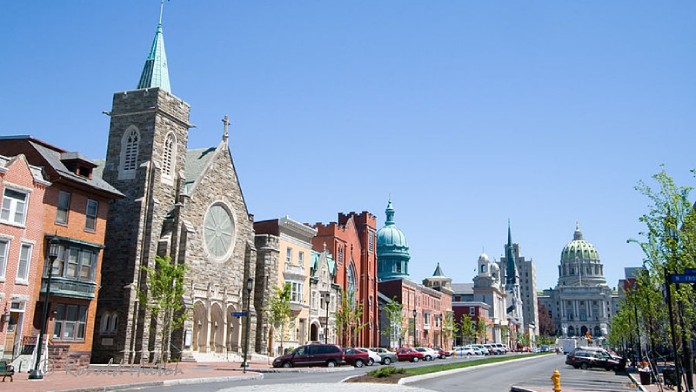Drug and Alcohol Abuse Statistics in Harrisburg, Pennsylvania
The Center for Disease Control keeps track of substance-related overdoses as well as the number of opiates prescribed in Harrisburg, PA:1,3,4
Residents of Dauphin County were prescribed opiates at a rate of 56.9 per 100 in 2019, and 53.9 in 2020
The rate of alcohol-induced overdose deaths increased by 21% between 2018 and 2020
Accidental drug overdoses dropped slightly at the same time, from 37.5 to 35 per 100,000 residents of the county
Other drug overdose fatalities, however, rose 6% between 2018 and 2020
Levels of Care for Rehabs in Pennsylvania
Several levels of substance abuse care are available to effectively meet each Pennsylvanian’s recovery needs.
Alcohol and Drug Detoxification
Detox is the process of safely removing drugs or alcohol from your system. This occurs in a supervised setting, such as a hospital or inpatient rehab, so professionals can comfortably manage your withdrawal symptoms.
Inpatient Care
Residential or inpatient treatment involves living at a rehab facility under 24/7 supervision and care. Treatment services usually include individual and group therapy, nutritional counseling, experiential therapies, and medication.
Partial Hospitalization Programs (PHPs)
PHPs allow you to live at home while receiving addiction treatment at a hospital. Treatment methods may be similar to inpatient rehab, but you can return home during non-treatment hours.
Intensive Outpatient Programs (IOPs)
A step down from a PHP, IOPs allow you to attend a few hours of counseling each week, spread out over several days. You can spend the rest of your time at home, working, or fulfilling other obligations.
Standard Outpatient
As the least intensive treatment option, standard outpatient care involves just one to two hours of treatment per week. Because it has the least oversight and supervision, this level of treatment is typically appropriate for highly motivated people who have a strong support system.
Relapse Prevention
Relapse Prevention, also known as aftercare, begins when you complete a Pennsylvania rehab program. It includes ongoing support and encouragement through 12-step groups, non-12-step groups like SMART Recovery, ongoing therapy, sober living homes, and more. Aftercare is an important part of relapse prevention.
How to Pay for Addiction Treatment in Harrisburg, Pennsylvania
Private Insurance
Insurance providers must cover substance abuse and mental health treatment services to some extent. However, specific coverage varies by plan, so Pennsylvania residents must contact their providers to confirm how much and which treatments are covered by their plan.
Pennsylvania Medicaid
Pennsylvania’s Medicaid program, Medical Assistance (MA), provides health insurance to low-income residents. It covers treatment services like inpatient drug rehab and outpatient substance abuse treatment. To qualify, residents typically are required to provide proof of income. Additionally, to use MA to pay for rehab, the facility must accept MA as a method of payment.
Pennsylvania Medicare
Pennsylvania Medicare is a federal program providing healthcare coverage to residents over the age of 65 as well as those with certain health conditions or disabilities. Pennsylvanians can use Medicare to cover the cost of drug addiction treatment services, including rehab. However, not all rehabs accept Medicare insurance.
TRICARE in Pennsylvania
Pennsylvania TRICARE (East region) is a government program that provides health insurance coverage for military personnel, veterans, and their families. TRICARE coverage includes addiction treatment services; however, specific coverage varies by plan.
Sliding Scale Rehabs
Sliding scale rehabs charge only what a resident can reasonably afford to pay, based on their income. To qualify for a sliding scale rehab in Pennsylvania, residents must provide proof of income.
IHS-Funded Drug Rehabs
Drug rehabs funded by the Indian Health Service (IHS) provide free addiction treatment to Alaskan Natives and Native Americans.

Local Information for Visiting Harrisburg, Pennsylvania
If you want to plan a trip to the city, or plan an extended stay to take advantage of an alcohol or drug rehab in Harrisburg, here is a quick guide on getting to town and what to do there:
- The Harrisburg International Airport in Middletown is the nearest airport to Harrisburg, about a 20-minute drive on highway 283. You can get to the city from the airport using the Capital Area Transit bus system if you don’t have a ride.
- Once in town, there are multiple motels and hotels to stay at, including the Red Roof Inn, the Days Inn, Econo Lodge, and the pet-friendly Radisson Country Inn and Suites.
- There are 19 public parks in Harrisburg, as well as the Boyd County Big Tree Nature Preserve, for those that want to take in the over 1,000 acres of some of the region’s largest trees.
- The city has three public libraries and 10 small free and congressional libraries.
- Families can take advantage of the 17 K-12 schools in the city, and ten institutes of higher learning for adults seeking to further their education.
- American history lovers have a variety of attractions to visit in the city, such as the National Civil War Museum and the nearby 1906 Pennsylvania State Capitol Complex.
- The city has 12 museums for your perusal, including the Pennsylvania National Fire Museum, the Susquehanna Art Museum, and the Doll House Museum featuring over 5,000 toys and dolls, some over 180 years old.
Pennsylvania Alcohol and Drug Laws
Pennsylvania lawmakers have enacted the following policies related to substance use, treatment, and overdoses:1,2,3,4
Law Enforcement Treatment Initiative: LETI allows residents of participating Pennsylvania counties to contact law enforcement for help in identifying a rehab facility—without the threat of arrest. The initiative also allows law enforcement officers to guide individuals to treatment rather than divert them into the criminal justice system.
Good Samaritan Law: This law offers legal protection for certain drug crimes to Pennsylvania residents who seek medical attention or administer naloxone during a drug-related overdose. The law is designed to encourage Pennsylvanians to call for help by removing the threat of arrest for drug-related crimes. To receive immunity, Pennsylvanians must report the incident to emergency officials, give authorities identifying information, and stay with the overdose patient until first responders arrive. The law does not provide protection for crimes of delivery or distribution of drugs.
Naloxone Standing Order: This order allows pharmacists to dispense naloxone without a prescription.
Marijuana Laws: In Pennsylvania, marijuana is illegal for recreational use. Residents can apply for a medical marijuana card if they have a qualifying medical condition. Qualified patients can carry a 30-day supply of marijuana in a non-smokable form. Illegal possession of marijuana can lead to a 30-day imprisonment and a $500 fine. If the illegal possession is for more than 30 grams of marijuana, the penalties can include up to a year in prison and a $5,000 fine.
Resources
- Center for Disease Control. (2022). CDC Wonder Tool.
- Substance Abuse and Mental Health Services Administration. (2022). Treatment Locator Map.
- Center for Disease Control. (2022). U.S. County Opioid Dispensing Rates, 2019.
- Center for Disease Control. (2022). U.S. County Opioid Dispensing Rates, 2020.


